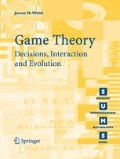Abstract
So far we have considered two-player games in the framework of Classical Game Theory, where the outcome depends on the choices made by rational and consciously reasoning individuals. The solution for this type of game (the Nash equilibrium) was based on the idea that each player uses a strategy that is a best response to the strategy chosen by the other, so neither would change what they were doing. For symmetric Nash equilibria, (σ*, σ*), we can give an alternative interpretation of the Nash equilibrium by placing the game in a population context. In a population where everyone uses strategy σ*, the best thing to do is follow the crowd; so if the population starts with everyone using σ*, then it will remain that way — the population is in equilibrium. Nash himself introduced this view, calling it the “mass action interpretation”. A natural question to ask is then: What happens if the population is close to, but not actually at, its equilibrium configuration? Does the population tend to evolve towards the equilibrium or does it move away? This question can be investigated using Evolutionary Game Theory, which was invented for biological models but has now been adopted by some economists.
Access this chapter
Tax calculation will be finalised at checkout
Purchases are for personal use only
Preview
Unable to display preview. Download preview PDF.
Rights and permissions
Copyright information
© 2007 Springer-Verlag London Limited
About this chapter
Cite this chapter
(2007). Population Games. In: Game Theory. Springer Undergraduate Mathematics Series. Springer, London. https://doi.org/10.1007/978-1-84628-636-0_8
Download citation
DOI: https://doi.org/10.1007/978-1-84628-636-0_8
Publisher Name: Springer, London
Print ISBN: 978-1-84628-423-6
Online ISBN: 978-1-84628-636-0
eBook Packages: Mathematics and StatisticsMathematics and Statistics (R0)

